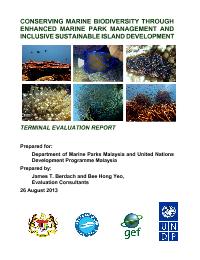
Terminal Evaluation for Marine Park Conservation project
Completedon 27 Nov, 2013
Evaluation Plan
Planned End Date
Dec 2013
Evaluation Type
Project
Management Response
Yes
Evaluation Budget
$30,000
Summary
A sound technical understanding of biodiversity and ecosystems is the foundation that underpins effective protected area management.
"Silo effect"--separating responsibility for terrestrial and marine management on small islands?makes finding workable solutions to shared problems more difficult.
A strong sense of community ownership, and recognition by communities that natural resources are their heritage (and realization that their livelihoods are closely tied to sustainable resource use) can contribute to a strong conservation ethic; even in systems that historically have applied a ?top-down? management approach (such as Malaysia?s), community-level support and cooperation are needed to curb adverse environmental impacts that could weaken conservation initiatives.
Creation of viable alternative livelihood opportunities can benefit marine biodiversity conservation efforts by (1) directly moving people away from destructive extractive fisheries practices, into services industries, and (2) fostering greater community cooperation, understanding and participation in conservation efforts.
Complicated project design, without clear indicators, makes implementation and monitoring and evaluation more difficult.
Effective marine conservation within protected areas requires detailed studies of the resources in the area, and tailoring of zonation plans to fit the specific needs for the location, backed up by appropriate legislation and regulations.
Effective marine conservation within protected areas requires detailed studies of the resources in the area, and tailoring of zonation plans to fit the specific needs for the location, backed up by appropriate legislation and regulations.
Frequent changes in key personnel (whether in project staff, executing agency, or steering committees) makes project operations inefficient and can cause lack of continuity and considerable delays.
In the absence of hard scientific data, local ecosystem knowledge (LEK) is an adaptive approach that can provide valuable information upon which preliminary planning can be based. However, the LEK information needs to be further ground-truthed and verified for more critical management decision-making.
Strong interagency cooperation can greatly enhance project efficiency and result in cost savings.
Evaluation Title
Terminal Evaluation for Marine Park Conservation project
Atlas Project Number
00034097
Plan Period
Status
Completed
Type
Project
Plan Date
1 Dec, 2013
Completion Date
27 Nov, 2013
Budget
$30,000
Expenditure
$0
Source of Funding
GEF
Management Response
Yes
Quality Assessment
Yes
Joint Programme
No
Joint Evaluation
No
GEF Evaluation
Yes
Expand
Stakeholders
Marine Park Department
Countries
Malaysia
Atlas Project Number
00034097
Plan Period
Status
Completed
Type
Project
Management Response
Yes
Plan Date
1 Dec, 2013
Quality Assessment
Yes
Completion Date
27 Nov, 2013
Joint Programme
No
Joint Evaluation
No
Budget
$30,000
GEF Evaluation
Yes
Expand
Expenditure
$0
Stakeholders
Marine Park Department
Source of Funding
GEF
Countries
Malaysia
National and local governments and communities have the capacities to adapt to climate change and make inclusive and sustainable environment & energy decisions benefitting in particular under-served populations
1: Environment & Sustainable Development


